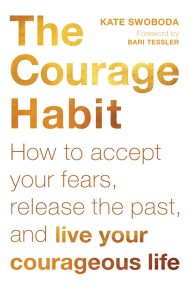How to Work with the Voice of Fear

All of us, despite the confidence we may exude, can and will experience fear. It is an emotion intrinsic to us as human beings and one that has secured our survival through ages of Darwinian evolution. But what to do when this fear crops up in situations that should just be challenging, rather than scary? And what if this fear prevents us from experiencing life, leaving us instead cowering in corners? Here, Kate Swoboda, author of The Courage Habit, offers some valuable advice.
When I began working with Taylor, it quickly became apparent that we needed to get a handle on the voice of fear, also known as the “inner critic.” Fear goes by many names—worry, self-doubt, lack of confidence—but everyone’s got some version of the critic, that internalized voice that undermines our best efforts with pointed critiques of how we’re messing things up or how someone else has already done something far better than we’re capable of doing.
Taylor’s inner critic could be downright vicious. When she felt nervous on client calls, for instance, she didn’t quite know what to do when she heard the critic say, in a tone of condescension and disgust, “How is a client ever going to hire you if you sound like a nervous idiot on the phone?” As a result, Taylor had fallen into the common trap of trying to avoid her fear by pretending it wasn’t there, and when that didn’t work, lashing out at the fearful voices in her head by telling them to shut up and go away.
It’s common to want to get rid of the voices of fear when they arise—the trouble is, this strategy doesn’t really work for the long-term. I shared this with Taylor and we began to work with the voice of fear using a process I’ve learned called, “Re-do, please.” Together, we looked at what Taylor’s critic was saying, so that the voice of fear could no longer have so much power. Our goal was face the voice of fear, rather than avoid it or try to shut it down.
When Taylor first began practicing “Re-do, please” with the things her critic said, it sounded something like this:
Critic: “How is a client ever going to hire you if you sound like an idiot?”
Taylor: (After taking a breath and accessing the body), would say to her critic: “Re-do, please. I’m open to hearing what you’re saying, but I need you to respectfully rephrase that.”
This was followed by thinking of how to get to the truth of what the critic was really trying to say, phrased in a more supportive way. Taylor repeated this process until a more supportive statement emerged: “It’s important to practice what you’re saying to a client, so that they’ll know you’re capable of doing the job.” This sort of statement got to the heart of the matter, and helped Taylor to think about what she wanted to do with her nervousness, instead of criticizing herself for feeling nervous.
To try the process for yourself so that you can interrupt the internal voices of fear that get you stuck, consider something that you know your fear often tells you when you’re trying something new or going after a big dream. Write down those statements, and then begin paying attention to them when they show up in your life.
Each time the critic says something that doesn’t feel respectful or supportive, respond internally with the statement “Re-do, please.” Then move into reframing what the critic has said, in a more respectful way. Sometimes, the critic’s tone is harsh, in which case you can add to your phrase with something like, “Re-Do, Please. I want to hear what you’re trying to say, but I need to hear a kinder, more neutral tone.” Repeat “Re-do, please,” with every harsh response your critic comes up with until you get down to the fear that’s at the core of that critic statement.
“I feel ridiculous,” Taylor told me when we initially began this exercise. So often, everything we’re taught about fear involves being uber-logical, and the re-do, please process slows everything down to get to the heart of the matter. As Taylor began working more deeply with this process, she began making connections to old family patterns and ways of being that she had been so conditioned into that she didn’t even realize it.
This exercise is a powerful practice. You don’t “get rid of” your critic, but through processing each of the critic’s fears, you find freedom from the fear. When the fear no longer shuts you down, stepping into bigger, bolder ways of living becomes possible.
The Courage Habit
by Kate Swoboda
What kind of life would you live if you didn't allow your fears to hold you back? The Courage Habit offers a powerful program to help you conquer your inner critic, work toward your highest aspirations, and build a courageous community.
Are your fears preventing you from living the life you truly want? Do you ever wish that you had a better job, lived in a different city, or had more authentic and nurturing relationships? Many people believe that they would do more, accomplish more, and feel more fulfilled if only they could rid themselves of that fearful inner voice that constantly whispers, "you can't do it."
In The Courage Habit, certified life coach Kate Swoboda offers a unique program based in cognitive behavioral therapy (CBT) and acceptance and commitment therapy (ACT) to help you act courageously in spite of fear. By identifying your fear triggers, releasing yourself from your past experiences, and acting on what you truly value, you can make courage a daily habit.
Using a practical four-part program, you'll learn to understand the emotions that arise when fears are triggered, and to pause and evaluate your emotional state before you act. You'll discover how to listen without attachment to the self-defeating messages of your inner critic, understand the critic's function, and implement respectful boundaries so that your inner voice no longer controls your behavior. You'll reframe self-limiting life narratives that can-without conscious awareness-dictate your day-to-day decisions. And finally, you'll nurture more authentic connections with family, friends, and community in order to find support and reinforce the life changes you're making.
If you feel like something is holding you back from landing your dream job, moving to a new city, having a satisfying love relationship, or simply taking advantage of all life has to offer - and if you have a sneaking suspicion that that something is you - then this one-of-a-kind guide will show you how to finally break free from self-doubt and start living your best life.








